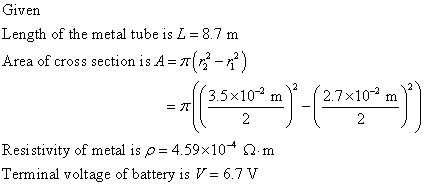Conducting Pipe: A pair of students working in a lab decide to use the plumbing to send electrical signals back and forth. They connect the terminals of a 6.7 V battery to the ends of a piece of metal tubing that is 8.7 m long. The tube has an outer diameter of 3.5 cm and an inner diameter of 2.7 cm. The metal is an alloy with a density of 5.72 g/ cm³ and a resistivity of 4.59 x 10-4 N ·m. When the pipe is connected to the battery, how much current will flow?
Conducting Pipe: A pair of students working in a lab decide to use the plumbing to send electrical signals back and forth. They connect the terminals of a 6.7 V battery to the ends of a piece of metal tubing that is 8.7 m long. The tube has an outer diameter of 3.5 cm and an inner diameter of 2.7 cm. The metal is an alloy with a density of 5.72 g/ cm³ and a resistivity of 4.59 x 10-4 N ·m. When the pipe is connected to the battery, how much current will flow?
Related questions
Question

Transcribed Image Text:Conducting Pipe: A pair of students working in a lab decide to use the plumbing to
send electrical signals back and forth. They connect the terminals of a 6.7 V battery
to the ends of a piece of metal tubing that is 8.7 m long. The tube has an outer
diameter of 3.5 cm and an inner diameter of 2.7 cm. The metal is an alloy with a
density of 5.72 g/cm³ and a resistivity of 4.59 x 10-4N m.
When the pipe is connected to the battery, how much current will flow?
Expert Solution
Step 1

Trending now
This is a popular solution!
Step by step
Solved in 2 steps with 2 images
